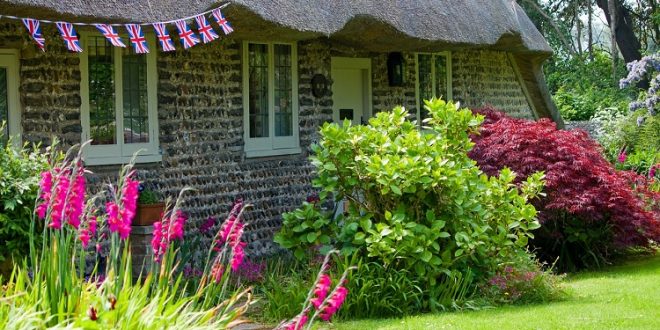Scientific research shows that greener front gardens reduce stress!
Even a few plants in a bare front garden could reduce your stress levels as much as 8 weekly mindfulness sessions, new research by the Royal Horticultural Society (RHS) and a collaboration of Universities (Sheffield, Westminster and Virginia) has shown.
Researchers have found that a greener front garden can also make you feel happier, more relaxed and closer to nature.
The four year scientific research project added ornamental plants to previously bare front gardens in economically deprived streets of Salford (Greater Manchester).
42 residents received: 1 tree (juniper or snowy mespilus), 1 shrub (azalea), 1 climber (clematis), sub-shrubs (lavender, rosemary), bulbs (daffodils, crocuses, snowdrops) and bedding plants (petunia, viola) to fill 2 containers. The experimental design included a control group who received the plants one year later.
By measuring the residents’ concentrations of cortisol hormone before and after the plants were added, the research team were able to see if the greenery had any impact on stress levels. Cortisol levels change across the day. In healthy diurnal patterns, levels peak in the early morning shortly after awakening and drop to the lowest concentration at night. Steeper daily declines indicate more effective regulation of circadian and hormonal mechanisms, which is a likely consequence of reduced stress.
Before the experiment, only 24% of residents had healthy cortisol patterns. Over the course of the year following the plantings, this increased to 53% of residents having healthy cortisol patterns.
Perceived stress levels decreased by 6% after the introduction of the plants. Over half (52%) of the residents said their front garden helped them be happier, 40% said it helped them be more relaxed and over one in four (26%) said it helped them be closer to nature.
Dr Lauriane Suyin Chalmin-Pui, who conducted the research as part of her PhD and who is now an RHS Wellbeing Fellow, said; “We can now further evidence the vital need to incorporate plants into our front gardens and domestic spaces. This will require a change in the way we strategise, design, plan and build our living spaces.
“The stress reduction data is startling, in that we found such a significant response with just a relatively small number of plants. Now we know that access to even a tiny patch of nature has beneficial effects for our health.
“Re-greening our neighbourhoods is really important. This data supplements other studies where we know garden plants help mitigate flooding, encourage biodiversity, reduce air pollution, as well as improve our health and wellbeing. We must reverse the trend to pave over our front gardens entirely, as it is possible to combine attractive, beneficial plantings with car parking space.
“Since I started this research, it’s been fascinating to see how adding plants to front gardens really did have a transformative effect on residents’ lives. Residents suffering from loneliness and other mental health issues found it especially uplifting and motivational.
“One of the residents said that greening up the front gardens gave him pride not just of his house, but of the whole area. Another said that just looking at the colours of the plants made her feel brighter in herself.”
Professor Alistair Griffiths (RHS) added; “With so many millions more people gardening after discovering a passion to grow during lockdown, the RHS hopes this research inspires more people to plant a few plants, from containers and window boxes to hedges and trees, in their street-side outside spaces.
“When we started this research four years ago and I first started thinking about it, the world was a very different place. Today life is even more stressful for so many, meaning the results of this experiment are more important than ever. This research highlights the essential role of private gardens and the horticulture and landscape industry in delivering natural capital that improves the health of our nation. Together we should all try to make a positive difference one plant at a time.”
Dr Ross Cameron (University of Sheffield) finished; “This is an instrumental piece of research in that it ties in the very positive emotions people have with plants and gardens, with physiological health measures. It strengthens the evidence that gardening and ready access to green space are vital components in relieving stress and promoting positive mental health in our urban communities.”
Visit https://www.rhs.org.uk/garden-inspiration/garden-types/front-gardens for ideas for parking and plants in front gardens.
Feel free to download the full article for details of the research here.
 Gardeners Club The Gardeners Club is a free to join online club for everyone with an interest in gardening and gardens.
Gardeners Club The Gardeners Club is a free to join online club for everyone with an interest in gardening and gardens.






